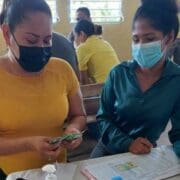Ghanaian official says nurse relationship with Barbados ‘here to stay’ Loop Barbados
Black Immigrant Daily News
Barbados and Ghana has created a “historic” relationship in the area of human resources.
This is according to Director of Human Resources in the department of the Ministry of Health in Ghana Kwesi Asabird who spoke to the media on Monday, October 10 following the arrival of 122 Ghanaian nurses.
The Ghanaian nurses who are the second contingent of nurses to arrive in Barbados will be assigned to various institutions across the island including the Queen Elizabeth Hospital, Geriatric Hospital, Psychiatric Hospital and several polyclinics.
“This is a historic relationship that our current president has built between himself and the Prime Minister of Barbados in the area of human resources of health,” Asabird contended.
… we are privileged to be part of this historic relationship and I believe we will do our part to sustain it
He explained that this relationship was created to better maintain the surplus of nurses produced in Ghana annually.
“Ghana has come to realize that we are gradually improving in the numbers and adequacy of human resource because we have a strategic plan where we allow the private sector, the government institutions and the Ministry Of Health itself to train nurses and we are able to produce over 20,000 nurses annually.”
“Looking at the numbers, we think that we cannot consume these numbers locally, we need to support other nations internationally and this is the first government that has decided as a matter of policy to send nurses abroad. The first country to receive this policy realization is Barbados. The first cohort came in the year 2020 and this is the second cohort.”
Asabird added that due to the feedback he has received following the first contingent of nurses, he predicts the relationship between Ghana and Barbados will continue.
“So for some of us we are privileged to be part of this historic relationship and I believe we will do our part to sustain it because both sending and receiving countries have roles and responsibility towards sustaining this kind of relationship and since the first cohort the feedback we are getting is that this relationship has come to stay.”
NewsAmericasNow.com






Leave a Reply
Want to join the discussion?Feel free to contribute!